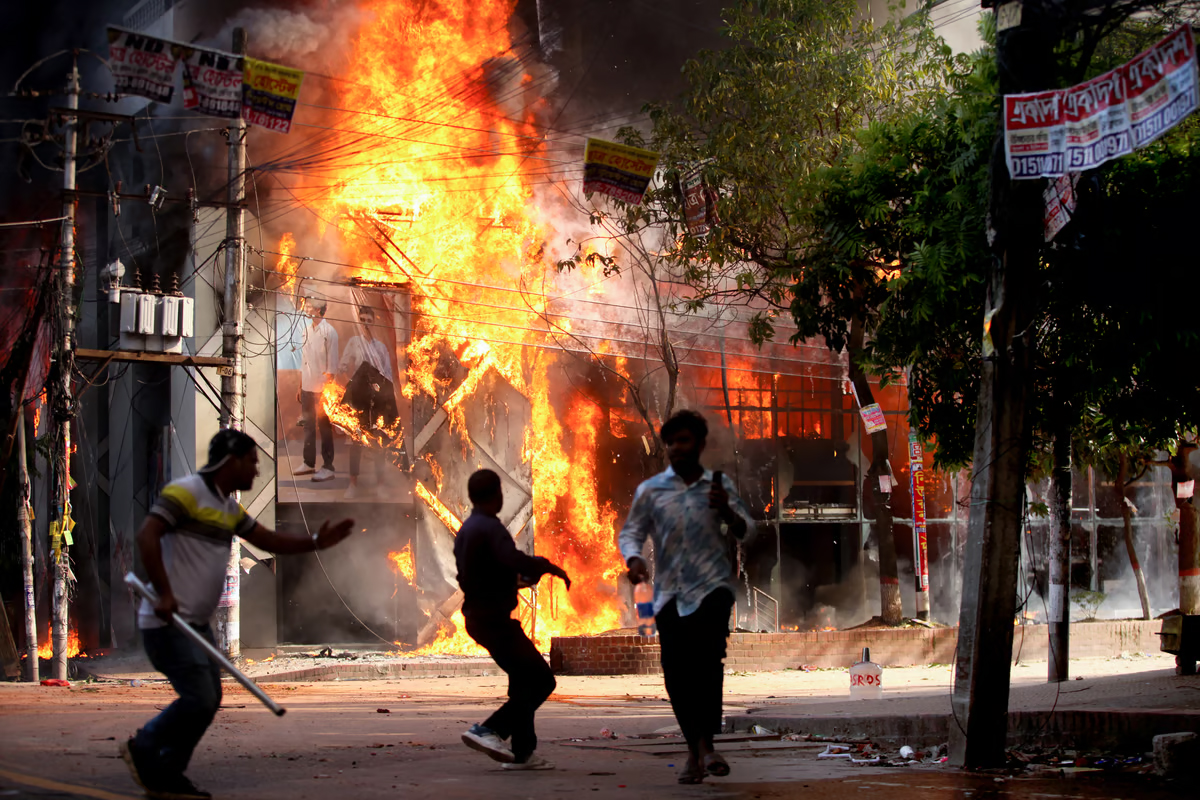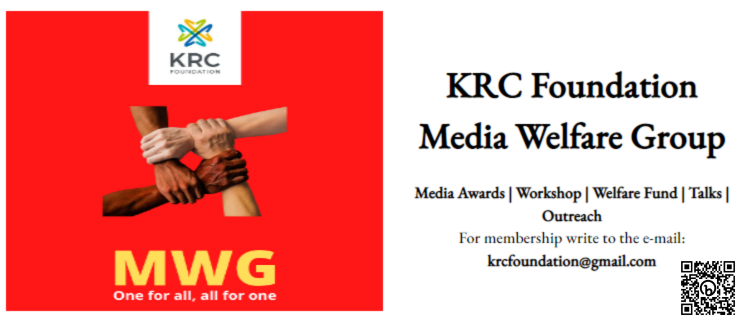It was a ‘Bloody Sunday’ Miscreants have turned the violence communal
 KRC TIMES Desk
KRC TIMES Desk

Dhaka : A Hindu councillor Kajal Roy from Rangpur, was among the 100 people killed in the violent protests across Bangladesh on Sunday. Reports indicate that houses and temples belonging to Hindus, including ISKCON and Kali temples, were targeted, forcing devotees to seek shelter.
Thousands of Bangladeshi protesters demanding Prime Minister Sheikh Hasina resign clashed with government supporters Sunday in one of the deadliest days since demonstrations began.
A curfew has been in effect since 6 pm on Sunday and will continue. A three-day closure of all establishments, including banks, has been announced by the government. However, essential services such as hospitals, water, gas, and electricity will continue uninterrupted indefinitely.
The chief of army has assured that normalcy would be restored within two days. The army was mostly seen firing blank shots in the sky to disperse crowds, as they had vowed on Saturday not to fire any bullets. The army did not fire at the protesters but did discharge blank shots into the air to disperse Chhatra League members in Cumilla.
“It was a ‘Bloody Sunday’ today. Miscreants have turned the violence communal. Social media like Facebook, Twitter, and YouTube have been blocked,” Professor Nazmul Ahsan Kalimullah, a political commentator from Bangladesh, told this newspaper.
PM Hasina has issued a stern warning for protesters who don’t seem to comply. Incidentally, Hasina’s cousin, Sheikh Sohel, had his house set ablaze by protesters. Additionally, a statue of Sheikh Mujibur Rehman was vandalised by an angry mob in Rajbari district. The office of Beximco House, a major pharmaceutical company, was also gutted.
“These kinds of protests are unprecedented in Dhaka; the opposition party is possibly being supported by a big power away from the subcontinent who was always against the present government.
There are many types of narratives that are floating, but what one does need to factor in is that the government will, on its own, not want the turmoil to continue as it goes against them. Times are uncertain, and one can only hope that peace prevails,” said a source from Bangladesh.

Mail your Resume: info@krcfoundation.org
Meanwhile, student leaders are urging students from across the country to march to Dhaka on Monday, a day earlier than originally scheduled.
“We would want the students to carve out a future for Bangladesh, revolution has already begun,” Pinaki Bhattacharya, an exiled Bangladeshi activist, told this newspaper. Nearly 100 people, including 14 policemen, were killed and hundreds injured on Sunday in fierce clashes between protesters demanding Prime Minister Sheikh Hasina’s resignation and the ruling party supporters in different parts of Bangladesh, forcing authorities to cut off mobile internet and enforce a nationwide curfew for an indefinite period.
The clashes broke out Sunday morning when protesters attending the non-cooperation programme under the banner of the Students Against Discrimination with the one-point demand of the government’s resignation over a job quota system faced opposition from the supporters of the Awami League, Chhatra League, and Jubo League activists.
At least 97 people have been killed in clashes, shootings and counter-chases across the country surrounding the non-cooperation program, leading Bengali-language newspaper Prothom Alo reported.
According to the police headquarters, 14 policemen have been killed across the country. Of them, 13 were killed in Sirajganj’s Enayetpur police station. One person was killed in Comilla’s Elliotganj, the paper said. More than 300 policemen were injured, it added.
The fresh round of clashes erupted days after over 200 people were killed in violent clashes between the police and mostly student protesters demanding an end to the controversial quota system that reserved 30 per cent of government jobs for relatives of veterans who fought in Bangladesh’s War of Independence in 1971.
Since then, more than 11,000 people have been arrested.
Officials claimed that today’s protests were joined by unidentified people and activists of rightwing Islami Shashontantra Andolon, which erected barricades on several major highways and within the capital city.
The protesters attacked the police stations and boxes, ruling party offices and residences of their leaders and burnt several vehicles, they added.
The situation prompted authorities to order a curfew in major cities and small towns across Bangladesh for an indefinite period from 6 PM Sunday, mobilising troops, paramilitary border guards BGB, and the elite anti-crime Rapid Action Battalion alongside police.
The government ordered the shutdown of Meta platforms Facebook, Messenger, WhatsApp and Instagram. The mobile operators were ordered to shut down 4G mobile internet, the paper added.
Asif Mahmud, one of the key leaders in the nationwide civil disobedience campaign, called on supporters to march on the capital on Monday. “The time has come for the final protest”, he said.
In several cases, soldiers and police did not intervene to stem the protests, unlike the past month of rallies that repeatedly ended in deadly crackdowns. Demonstrators in Dhaka, surrounded by a tightly packed and cheering crowd, waved a Bangladeshi flag on top of an armoured car as soldiers watched, according to videos on social media verified by AFP.
Vast crowds of protesters, many wielding sticks, packed into Dhaka’s central Shahbagh Square on Sunday, with street battles in multiple sites, police said. “There were clashes between students and the ruling party men,” police inspector Al Helal told AFP, saying two young men were killed in Dhaka’s Munshiganj district.
“One of the dead was hacked in his head and another had gunshot injuries.” Another policeman, who asked not to be identified, said the city had “turned into a battleground”.
Police and doctors also reported deaths in districts in the north, west, south and centre of the country.
Meanwhile, Prime Minister Hasina said that those engaging in “sabotage” across the country in the name of protest are not students but terrorists and asked people to suppress them with a firm hand.
“I appeal to the countrymen to suppress these terrorists with a firm hand,” she said.
Hasina called a meeting of the National Committee on Security Affairs—the highest policy-making authority of national security—at Ganabhaban, the paper reported citing sources from the Prime Minister’s Office (PMO).
The meeting was attended by the chiefs of the Army, Navy, Air Force, police, RAB, BGB, and other top security officers. The meeting came as renewed violence spread to several parts of the country.
The government has announced a three-day general holiday on Monday, Tuesday and Wednesday to ensure public safety amid the ongoing violent protests across the country.
Giving details, the paper said eight people were killed in Feni, 22 including 13 policemen in Sirajganj, four in Kishoreganj, six in Dhaka, five in Bogura, three in Munshiganj, four in Magura, three in Bhola, four in Rangpur, three in Pabna, five in Sylhet, three in Cumilla, two in Sherpur and one in Joypurhat. One person was killed in Keraniganj, one in Savar and one in Barisal.
Six Awami League leaders and activists were beaten to death and several others injured in a clash between the ruling party supporters and protesters in Narsingdi, the paper reported.
In the capital, protesters took away the bodies of four people from Dhaka Medical College Hospital. The protesters went to the Central Shaheed Minar with the bodies of the four victims and chanted anti-government slogans, it said.
Citing Dhaka Medical College Hospital sources, the paper said 56 people were brought to the hospital with bullet injuries from Shahbagh, Shanir Akhra, Nayabazar, Dhanmondi, Science Laboratory, Paltan, Press Club and Munshiganj.
In a related development, a group of former senior military generals Sunday asked the government to withdraw the armed forces from the streets and send them back to barracks.

“We urge the government to undertake political initiatives to resolve the ongoing crisis. Do not destroy the good standing of our armed forces by keeping them engaged in a disgraceful campaign,” said former army chief Iqbal Karim Bhuiyan, who served as the army chief under Prime Minister Hasina’s government.
Reading out a statement at a media briefing here, he said, “The Bangladeshi armed forces have never faced off with the masses or trained their guns at the chests of their fellow citizens.”
Another former army chief, octogenarian general Nuruddin Khan, who also served as the energy minister in Hasina’s past 1996–2001 tenure, was one of those who joined the briefing along with fellow officers, some of them being 1971 Liberation War veterans.
“Time is ripe to immediately take the soldiers to barracks to prepare themselves for any eventuality, as the time taken to transition from internal security mode to operational mode takes quite some time,” the statement read.


